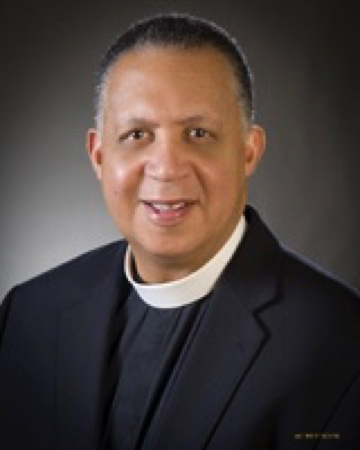Rev. Willie H. Mebane Jr. ’75
2022 Beech Outstanding Alumni Award

As chair of UNC’s Black Student Movement from 1973 to 1974, Willie H. “Will” Mebane Jr. once introduced Bobby Seale, co-founder of the Black Panther Party, and Angela Davis, a professor at the University of California, Santa Clara, and former member of the Communist Party USA, at a speaking engagement in Memorial Hall.
He also joined other UNC students in protest after University leaders invited David Duke, a white supremacist and former grand wizard of the KKK, to campus.
Mebane, a Durham native, didn’t shy away from tough situations.
“Serving as BSM chair formed my personal life and contributes to this day to my professional work,” said Mebane. “It was during that time that I learned organizational skills that continue to serve me well.”
Indeed. Mebane is an ordained priest and the ninth rector of Saint Barnabas’ Episcopal Church in Falmouth, Massachusetts. As the first African American to be dean of St. Paul’s Cathedral in Buffalo, New York, he is only the seventh African American in the 238-year history of the Episcopal Diocese of Massachusetts to lead a virtually all-white congregation.
He’s been presented the “Faith in Action Award” by VOICE Buffalo, a nonprofit with a mission to “faithfully bring forth social justice and equity.” He was honored with the “Joan Malone Award” by the Coalition for Economic Justice for his leadership in the “Fight for $15” to increase the U.S. minimum wage. He was featured as a 2020 “Religious Leader of Change” by USA Today. And recently he received an award for “THE Conversation,” a television program addressing racism.
It’s no wonder Mebane has been named a Harvey E. Beech Outstanding Alumni.
“As my classmate at UNC, Rev. Mebane was a standout among students, not only because of his academic achievements, but because of his vision and his service, which set the trajectory for his accomplished life,” said Janine Y. “Cookie” Bell ’76, president and artistic director of Elegba Folklore Society. “Many are called, but few are chosen. Willie heeded the call.”
Bell said under Mebane’s leadership, Black students felt a comforting and much-needed sense of family. “At the same time, as a servant leader he represented our causes to both the University chancellor and the UNC System. Rooted in this 1970s time frame, and on the heels of the civil rights movement, Willie’s activism cleared his lens for the social justice work that would become his life, often in unexpected places. Excellence and righteousness define him…”
Evelyn Dove Coleman ’75 (‘78 JD) said when she met Mebane at UNC he reminded her of Beech.
“He was a fearless leader, and he wasn’t afraid to pursue justice on campus,” she said. “Astoundingly, racial disparities continued to exist at Carolina when we were students in the 1970s, just as they had when Harvey Beech was a student in the 1950s. And just as Harvey Beech stood up to his chancellor and refused to return his swimming pass, Willie Mebane stood up to his chancellor and called for equal treatment for all students.”
Mebane credits his parents for infusing him with a passion for and commitment to social justice. He fondly remembers one-on-one Thursday morning teas with then-Chancellor Ferebee Taylor, as well as impromptu conversations with then-UNC System President Bill Friday and conversations with former Head Men’s Basketball Coach Dean Smith about the need for Black coaches on his staff. The two men corresponded periodically until Smith’s death.
“Little did I know these encounters with such men of power would prepare me for a lifetime of engagement with world leaders that have included U.S. presidents, governors, corporate tycoons, members of Congress, archbishops and other men, and subsequently women, in authority. Carolina prepared me to speak truth to power on behalf of others,” Mebane said.
Carolina also blessed him with something — make that someone — else invaluable: His wife.
After a bumper sticker on his 1972 Chevy Impala caught the attention of the former Paulette Walton, she walked down Franklin Street to ask Mebane about it.
“That was perhaps the defining and most memorable moment at Carolina in my personal life,” Mebane said. “She became my wife six months later and has for 49 years been a partner in the professional life that has shaped who I am today. Paulette has been a steady balm for this bruised and battered soul as I’ve continued to fight for human rights.”